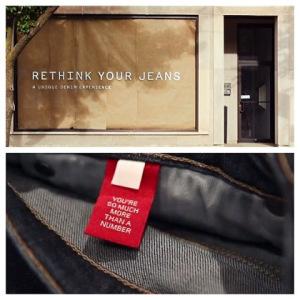 I don’t often talk about a single television spot but the Special K “More than a number” campaign has generated a spot that really defines women as more than sizes or numbers. Special K and their agency Leo Burnett actually created a pop-up store for women buying jeans. The proposition is real. Women fear only one thing more than shopping for jeans and that is shopping for a swimsuit. They talk about depressing feelings related to the shopping experience. Every woman I know talks about fat jeans, comfortable jeans and skinny jeans, but Special K has tried to change the language.
I don’t often talk about a single television spot but the Special K “More than a number” campaign has generated a spot that really defines women as more than sizes or numbers. Special K and their agency Leo Burnett actually created a pop-up store for women buying jeans. The proposition is real. Women fear only one thing more than shopping for jeans and that is shopping for a swimsuit. They talk about depressing feelings related to the shopping experience. Every woman I know talks about fat jeans, comfortable jeans and skinny jeans, but Special K has tried to change the language.
Hidden cameras capture women as they are shopping in the pop-up store. A surprising thing happens when they find out there are no sizes on the jeans. Their whole attitude changes when they find out that the jeans are not sized in numbers but in words like “fabulous”, “confident”, and “radiant”. The women were free from numbers and were affirmed that they were beautiful.
As women, our self-esteem and confidence is enhanced when we are not tied to old tapes we play in our head. And advertising can play a role in establishing new self affirming roles for women.
Research shows that if we feel more attractive, we are more confident. Jane Risen, an associate professor of behavioral science at the University of Chicago Booth School of Business, says “The most relevant study that comes to mind for me is a classic study looking at self-fulfilling prophecies,” she said. Men and women had a 10-minute conversation, via headphones and microphones so they couldn’t see each other. Before the chat, the men were given fake pictures, so half of them believed they were talking to an attractive woman, and the other half an unattractive woman.
“The most remarkable finding was that an independent set of coders who listened only to the women (and didn’t see a picture) also thought that the women who were supposedly more attractive were more friendly and sociable,” Riser said. “In other words, being perceived by the men as attractive lead the women to act differently such that other people came to believe the same thing that the men believed.”

